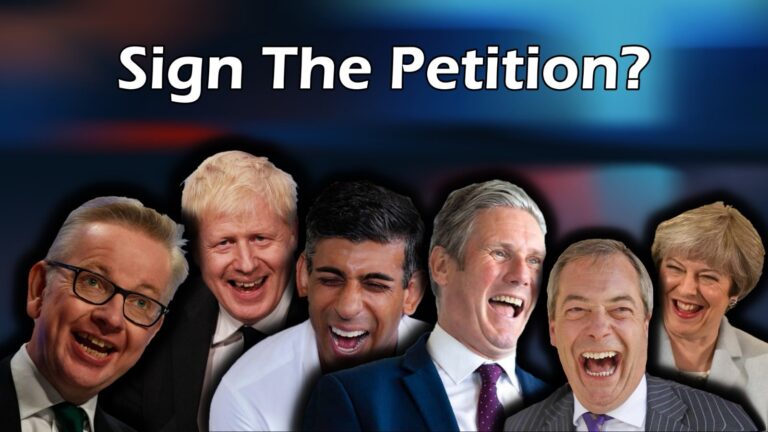The Capillary Wave

Kris Brooks Podcast #4 - Protest and Petitions Explained
Understand Law and Governance at: capillarywave.com
I have just launched my own Youtube channel! On it I will be discussing all things law and governance and explaining how I have built my family a farm without asking for government permission to do so. I will also be showing some of the building, and farming projects I have going on. The channel is linked below:
The Merit Of Protest And Petitioning – What Every Citizen Needs To Know
- Introduction
- Who Can Petition And How Do Petitions Work?
- My Story Briefly
- Hey Mr!
- The Citizens Position In Governance
- Up Is Down – Suffer And Protest
- Arguing Against Yourself
- The Resident, A Citizen Of A District And Ward
- The Most Powerful Position In Governance Available
- Conclusion
- Commoners Who Think They’re People
- Other Podcasts
Introduction
As always the information discussed here applies right across the English speaking western world, especially as most/all commonwealth countries are under the rule of the Crown
It is my aim for this discussion on the merits of Petition and Protest to be the “go to” reference point for your audience on this topic, and hopefully this podcast will get linked and shared to their own discussions and arguments online around the subject of petition and protest, such as whether it is an effective way of instigating change, or even holding government to account legally speaking
What better timing could we ask for when we have recently had the biggest and fastest petition to reach the UK government, with well over 3 million signatories calling for an immediate General Election.
This examination of protesting and petitioning should be essential viewing for this important and serious period in political history
The whole mission for my website: capillarywave.com is to show the general public how they are being governed. How we are governed in reality is often very different (often opposite) to how the average citizen believes governance works; and nowhere is this more evident than when examining what “protest” and “petition” actually means.
There may never be a better example of a “protest” to examine and use for this discussion, than the fastest growing government petition of all time, which led to a debate in the House of Commons on the motion:
“I would like there to be another General Election…”
The petition was shared widely on the social media platform: “X” (Twitter) and was being championed by political commentators and celebrities alike.
- Follow Capillary Wave on “X” (Twitter)
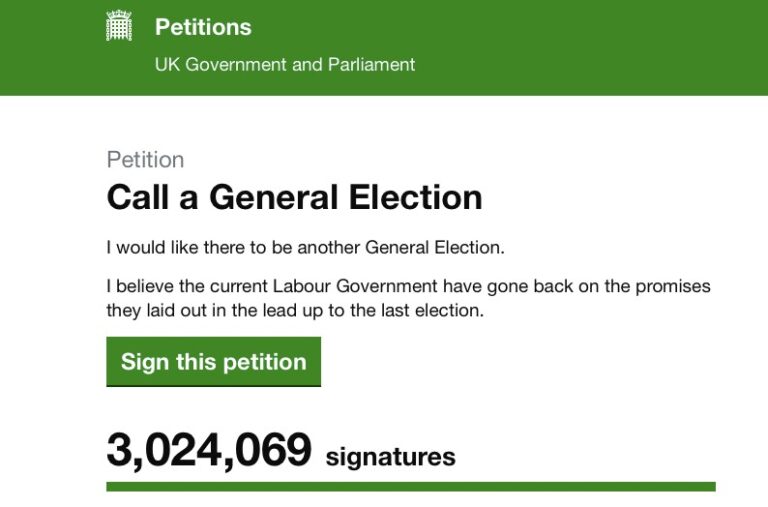
Given that this petition broke many records and was supported by millions of the general public, the political class, politicians themselves, celebrities, writers and broadcasters; surely this protest, this petition, of all petitions would bring about the change and opportunities that so many citizens voters wanted, and would prove the assertion for the general public that protests, petitions, and petitioning are an effective of bringing a government to account? Let us find out definitively…
Who Can Petition And How Do Petitions Work?
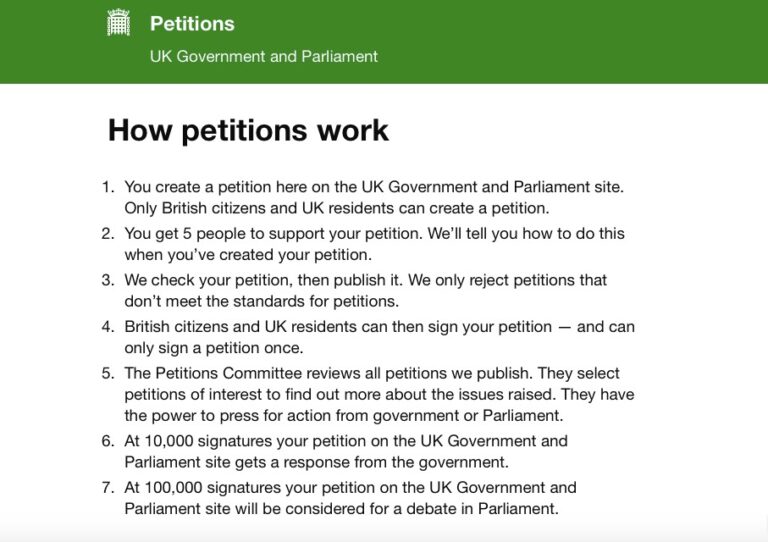
Very clearly those who can petition in the first instance are “British Citizens and UK residents”.
British Citizens and UK residents are subject to Parliament and its Acts.
You become a British Citizen and UK resident predominantly by registering your name on the electoral role, and therefore you elect to be governed by consent, as explained very briefly here, by Daniel ShenSmith, also known as: the Black Belt Barrister on his YouTube channel:
Here the Claim Of Right Act 1689 evidences that it is a right and a privilege of British subjects to protest

Here the Bill Of Rights [1688] evidences that it is a right of subjects to petition

So we can plainly see that to become a British Citizen and UK resident you have to be a subject of the King and his government. The definitions of the above words synonymous with being a “subject” explains in great detail your position as a citizen of the state, that being: “that which one is bound or obliged to do, especially by moral or legal claims a duty“
To become a subject of the King you first need to enrol your legal name on to the electoral register which then binds you morally and legally
To learn more about your Legal Name see Word Index: Legal Name.
The application, and the enrolling of the Legal Name to the electoral register then places you as a British Citizen which makes you a subject of the King, and it also makes you a UK resident at law. This is explained in more detail in my article: How You Became Entangled In The Legal System which is well worth reading

*
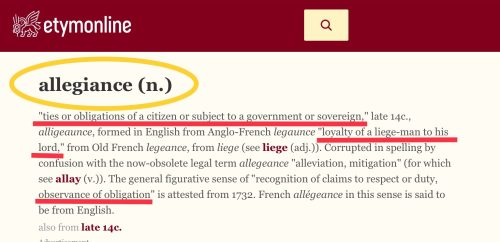

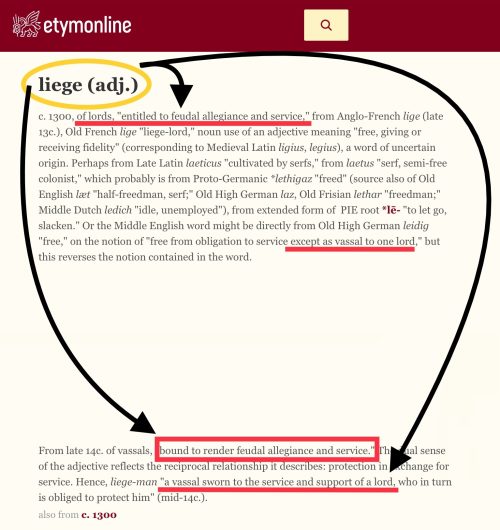
*

My story briefly:
I came to understand law and governance through my own planning enforcement problems with a local council who assumed that they were also my authority; they were not. Those enforcement issues led me on a journey in to the heart of the legal and court system. I learned lots about law and governance, and helped others at court which culminated in assisting farmer Mr Robert Fidler who built a castle behind hay bales in Surrey. This was the highest profile planning enforcement case in the UK at the time. Robert was due at the High Court in London for a committal hearing brought by Reigate Council; and I assisted in keeping him out of prison. Here is Mr Fidler’s High court appearance:
You can learn a bit more about me and my journey here:
Hey Mr!
Your Chosen Rank and Title Of State
If you have an Member of Parliament (MP), that makes you a member part of the House of Commons, and that is why you are known at law as a commoner; because you registered “your legal name” on to the electoral roll, and you voted for an MP, and sent this person to the House of Commons as your representative. It then follows that you are the government that they (the MP’s) are representing. Your MP’s are NOT the government; they merely represent YOU. You are the government that they represent. This is explained more in my short article: How You Became The Government
Now that you are a commoner; which is a member of the House of Commons which enacts bills to become legislation, and therefore law; you are deemed to understand this process. As a commoner, you are not only a member part of the state, but you also have a representative (MP) serving on your behalf, at your request, at the House of Commons.
When you became a commoner you received a new rank and a title in that new House/ society. Your rank is “commoner” and your title for that rank is Master; you may be more familiar with that title written as: Mr, Messers, Mrs or Ms. The title which you have chosen for yourself belongs to that of the lowest rank in your newly chosen society, a member of the Third Estate of the Realm: a citizen commoner; which is at law a third class citizen. A commoner (which is most likely you reading this), are at law a third class citizen. This applies across the English speaking commonwealth countries
- Commoner definitions: Commoner
The Citizens Position In Governance
*
*
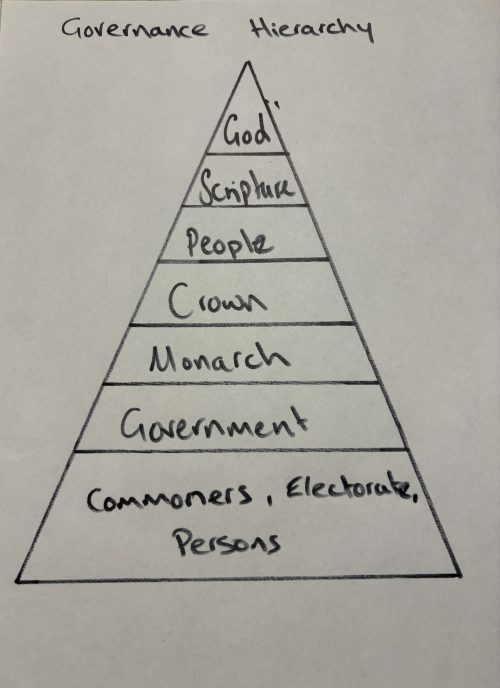
As you can see from the above drawing of the hierarchy of law and governance the citizen commoner is on the lowest rung of the ladder of authority and influence; which of course it would be because a commoner is at law a third class citizen, belonging to the state. These claims are evidenced further here: How You Became The Government
- Word Index: Person
Up Is Down – Suffer And Protest
We have discovered that to petition and protest factually and legally speaking, you have to be a citizen of the state. The state deem it as a right and a privilege for their citizens to be able to protest.
We have seen that the citizen’s position in governance is the lowest tier possible; that being that of the rank of a commoner, with a given title of master (Mr, Mrs, Ms, Messers), which equates to the status of a third class citizen of your country (UK and Commonwealth)
Now that we have evidenced that the position of the citizen commoner is as low as you can get, let us examine some of the key words themselves in this discussion on protesting and petitioning government:


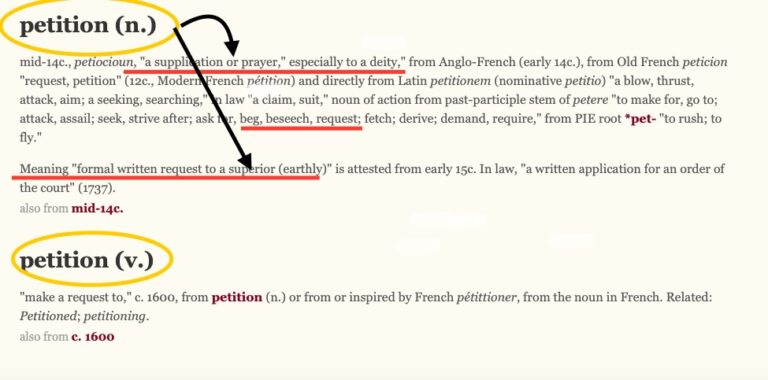

Just as the word ‘suffer” also means to allow something to happen to you, so the word “protest” means an “avowal” which is to acknowledge, declare, uphold, support and approve. Further; a “petition” means to: beseech, a prayer to a deity, supplication or prayer to a deity, formal written request to a superior
Clearly to “protest” and “petition” does not mean what so many beLIEve it to mean, in fact it means the exact opposite: it actually means to agree with, uphold, and approve.
Words are so very important, and most of us have no idea what the words we use mean in reality. Therefore our ignorance is used against us, and protesting is a classic example of this.
Is it any wonder then that this was the government response to the record breaking petition featured herein?:
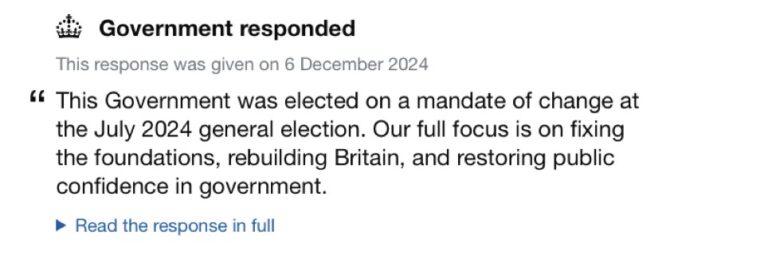
This is why you never see solicitors, barristers or judges out on the streets “protesting”, because they understand what protesting and petitioning means
Arguing Against Yourself
The Insanity Of The Citizen Protester
We have evidenced and firmly established that only a British citizen can protest the Government, and a citizen and resident are what is known at law as a “commoner”, precisely because as a citizen you are a member of The House of Commons, just as a lord is a member of the House of Lords
Being a member of that law making government body is what makes you a commoner, you are a law maker. You are a member part of the state machinery which makes the laws that govern you. Your Member of Parliament represents you. He or she is there on your behalf, representing you and carrying out your requests in the law making House.
This is why “ignorance of the law is no excuse”. You can never be deemed to be “ignorant” of the law, precisely because you are one of the law makers; you are self evidently, a commoner! A member of The House of Commons
This is the situation in fact, and at law, as has been evidenced. This is how governance works and the “consent of the governed” is gained:
- You start off as a people and then enrol yourself on to the electoral register thus now having the right to vote in elections and to select a person (MP) that will represent you at Parliament.
- Now that your name is on the electoral roll there is written evidence of your consent to be governed by the Acts and Statutes of Parliament
- Now that you have an MP, you are at law what is known as a “commoner” which is: a third class citizen in the eyes of the law, belonging to the state.
- You have now become a “person” at law which is a new status and completely different legally speaking to being one of the people. This process happened via the Representation of The People Act 1867. For further explanation see the Word Index: Person
- Now that you are a “person” of the state, you now have a new rank and title for your new society; the society controlled by the body politic of state. Your rank being “commoner”, and your title being “master” – that is what the abbreviations: Mr, Mrs, Miss, Ms, Messers means: master
- You are now a law maker. Your act of enrolling on to the electoral register means that you have now consented to all of the laws that are passed in the future at Parliament, and that are currently on the Parliamentary books. This is known as “The consent of the governed”
- This is why to protest means to agree and give consent to. You have already agreed and consented to the very laws to which you are “protesting”
The Resident, A Citizen Of A District And Ward
If you think the misery of being a citizen stops at becoming a third class citizen you are mistaken. There’s more to come. Your personal property is now under a new lord who can withhold it at will.
In the body politic known as the UK, Members of Parliament are chosen from a “ward” of a “district”. By becoming a citizen commoner you now place yourself under the jurisdiction of a ward and a district as a resident. Below are the definitions of “ward” and “district”, and when you read those definitions things should become a lot clearer for you as to how the state perceives you and treats you as the third class citizen that you are:
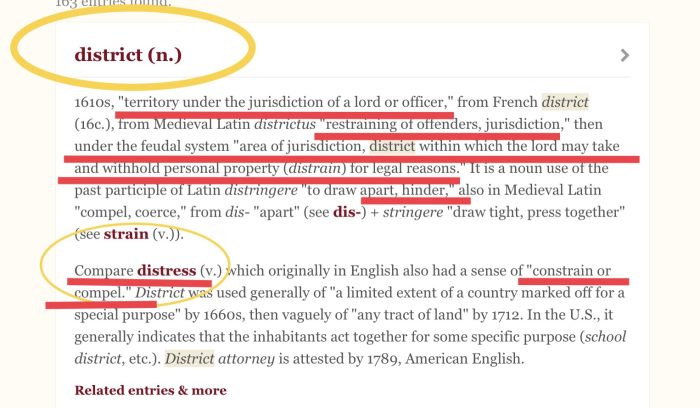
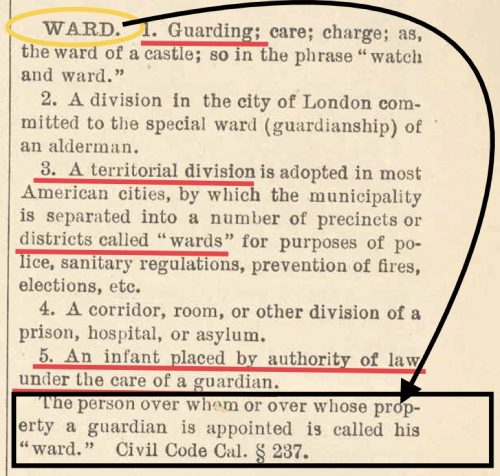
- Word Index: Property
The UNITED KINGDOM is divided in to “districts”. You as a citizen commoner will be in one of those districts under a new “lord who can take and withhold personal property”.
If you are thinking that these definitions do not hold water at law, you are grossly mistaken, as farmer Mr Danny Beach and his wife explain in the below interview. They had Padd Farm taken from them, and they were both put in prison by Runnymeade Borough Council:
I mentioned earlier that you have become a “person” of the state by enrolling to vote. All of these points are explained more fully in all of my articles which are freely available on the Home Page of my website where you can learn much more about how you are truly being governed.
Being a “person” of the state is not a good position to be in. Even the judges are “no respecters of persons”. In the video below, Supreme Court Judge Brett Kavanaugh’s swears to be “no respecter of persons” as seen here:
Supreme Court Judge Brett Kavanaugh makes that statement in his ceremony precisely because of these Bible quotes:
- James 2:9 – KJV 1611 – But if ye have respect to persons, ye commit sin, and are convinced of the law as transgressors.
- Job 13:10 – KJV 1611 – He will surely reprove you, if ye do secretly accept persons.
- Proverbs 24:23 – KJV 1611 – These things also belong to the wise. It is not good to have respect of persons in judgment.
- Proverbs 28:21 – KJV 1611 – To have respect of persons is not good: for for a piece of bread that man will transgress.
- Job 32:21|22 – KJV 1611 – Let me not, I pray you, accept any man’s person, neither let me give flattering titles unto man. For I know not to give flattering titles; in so doing my maker would soon take me away.
The Most Powerful Position In Governance Available
I do not wish this discussion to go off topic and I really want to keep this to “protesting”, but I feel we also have to briefly mention the other position we can be in at law outside of being a state owned citizen person, and that is the position of a “people” which is the most powerful position you can be in on Earth, and is recognised as such at law and by the state itself, which currently controls you as their person, citizen and subject
On this Earth, at Law and in terms of your governance, you are either a people or a person, and by electing to become a citizen of the state you become a “person” by default, which is the lowest tier and has no authority.
By registering on the electoral roll and voting you leave that higher position of a “people” and become a “commoner”, a third class citizen.
These are things discussed and evidenced further at my website via the public articles, and I have explained these aspects of governance; the two tiers of society, in a recent interview I had with Richard Vobes which can be seen here:
People vs. Persons
Very briefly:The King wears two crowns of office, The St. Edward crown – which is the “crown of God”, and the Imperial (Roman) crown – which is the crown of state which signifies the office of the UNITED KINGDOM. The King serves God’s people under the St. Edward’s crown , and rules over the persons and citizens of the UK from the office of the Imperial crown
Judges also swear two oaths of office. One oath is to God, and the other oath is for the office of the UNITED KINGDOM to rule over persons of the state
A Police Officer also holds the office of a Police Constable. Just as the higher offices of state operate in two jurisdictions, so do policemen and women. A police officer has corporate liability and enforces the policies of the polity: the United Kingdom against persons of the state; residents and subjects. The office of constable has personal liability, and a constable’s oath is under God. A constable has sworn an oath to protect the people (not persons of the state whom they enforce policy against
Lastly, your local councils law document; their constitution also evidences these two positions that mankind can find themselves in at law: people vs. persons.
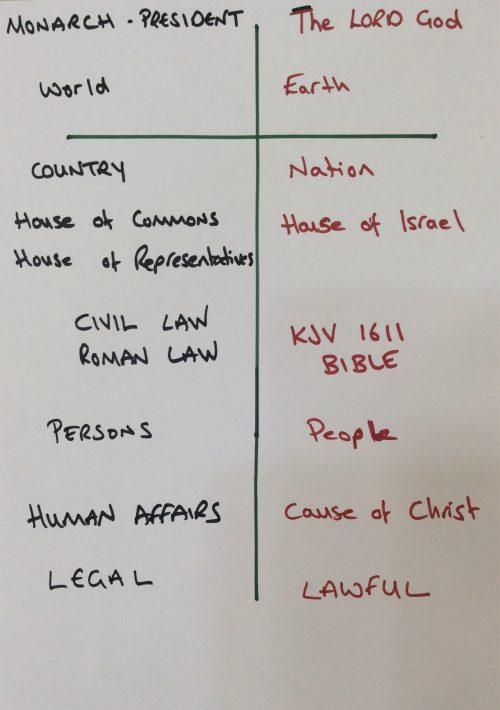
The most obvious place that this distinction between persons and people can be evidenced legally speaking outside of the Representation of The People Act 1867, is your local councils constitution document. A constitution is a law document that binds the council and its officers.
Obviously being a creation of the state the local authority also have to abide by the Acts of Parliament, but the constitution document is their “Bible”. The constitution lays out what a council can, and can not do, and who is responsible for what duties. It is an extremely important document and is readily available to members of the public and people upon request, and it has to be by law.
As evidenced throughout my website and in law and governance itself, your own councils constitutional document shows us that your local council has a duty to both “people” [of God], and “persons” [of the state].
In the councils constitution people get a mention and persons of the state are referred to as “the electorate” and “residents” and sometimes just: persons.
People and persons as evidenced in this councils constitution document:
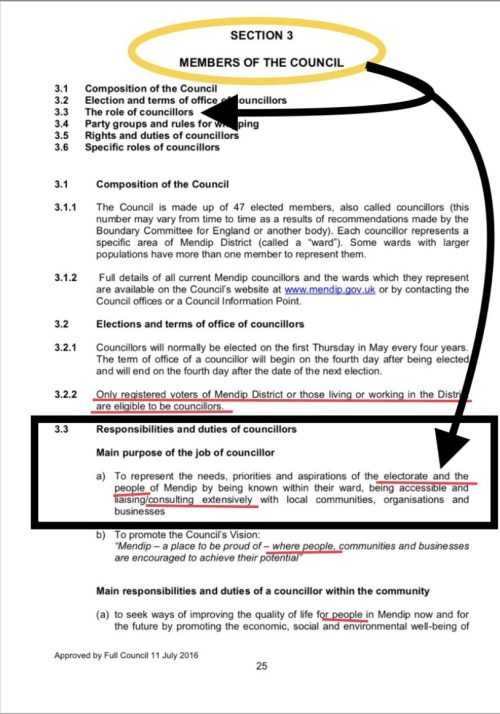
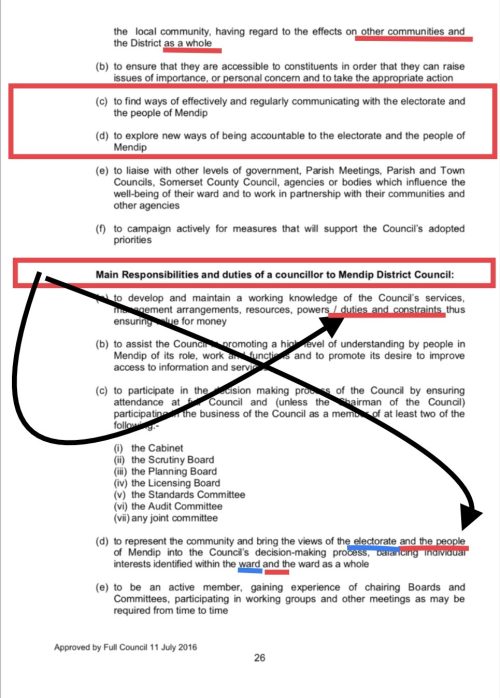
- “Other communities and the District as a whole”
- “communicating with the electorate and the people”
- “being accountable to the electorate and the people”
- Section (d) of page 26 from the above photograph really evidences this point of people vs persons beautifully.
If you are a “person” of the state you are one of the “electorate” and you will be treated as being in a “ward” of a “district”, and the definitions of these two words ward and district will bring in to sharp focus the problems that the general public are facing when making their arguments against the local authority.
This discussion between Kris Brooks and myself is essential viewing to understand these two positions it terms of your local council:
Conclusion
It is self evident that if you are in the position of a “commoner”, which is the position of third class citizen belonging to the state you are living in a ward of a district; therefore if you are protesting lockdowns, gender studies at primary schools, 5G towers, illegal immigrant camps, or farmers inheritance taxation, you are arguing against yourself, against the laws which you consented to. Furthermore, the death nell of this debate is that we have proven beyond all doubt that to “protest” is to “agree”, “consent”, “approve”; and to show “frank acknowledgement”
You as a commoner, a person of the House of Commons and subject agreed to all of these Acts, Statutes and mandates that are passed at the House by your representatives. Those representatives, represent you. You are the government, and the MP’s are only your representatives. So protesting and complaining to the executive branch about the laws and policies which you yourself have passed, is nonsensical and is the reason why you are ignored.
In fact you even elected an executive branch to make sure that when you protest against the laws which you have enacted that you would be thrown in jail if you get too unruly protesting against the laws which you yourself consented and enacted. Which is why ignorance of the law is no excuse, you can not be deemed ignorant of the laws when you are a member part of the law making machinery.
Why on Earth would anyone want to “protest and petition”, when all it demonstrates is a an ignorance of law and governance”
Commoners Who Think They’re People
I have shown that to be one of the electorate you will have made an application to be enlisted on the electoral register. Whilst “your name” is still on the electoral roll there is written evidence supplied by yourself in application form of your consent to the system of governance, and your vow to a new lord to become a member of a new House, in a district of the state, whereby your new lord can take and distress your personal property as it is under his guardianship in his ward.
- Romans 12:2 – KJV 1611 – And be not conformed to this world: but be ye transformed by the renewing of your mind, that ye may prove what is that good, and acceptable, and perfect, will of God.
Once we come to understand how we became ensnared, we can begin to realise how we can untangle that, and getting the Legal Name off of that electoral register is the first step.
So you see there is clearly a two tier system available on Earth for the people of God, and for the persons of the state in operation. That fact of the matter is that we have not understood the system very well and we have been acting as one of the states persons, which is in the lowest tier of society: a commoner, belonging to the House of Commons. A commoner is a third class citizen of the state.
To evidence how few actually understand the technicalities of law and governance, or even their own legal standing as a “person of the state”, this petition will serve as a reminder that no “people” can ever be in a position to sign a petition, because to be able to sign a petition you first have to be either a British Citizen or a UK resident. That means that you would have to have already entered your name on to the electoral register, therefore you have already consented and agreed to the Acts of Parliament, and relegated yourself to the gutter of law and governance as a third class citizen; a commoner, and have left the position as one of the people well behind. Those are the facts of the matter.
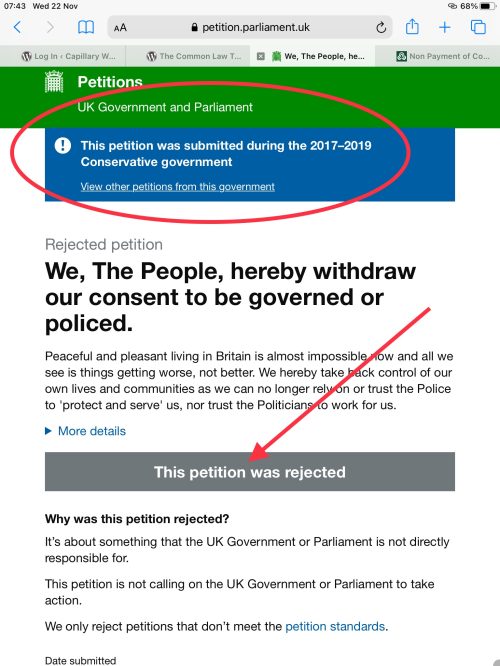
It is hardly surprising that this petition was rejected. The only thing that this petition served was to evidence how many are still ignorant to the way that they are being governed.
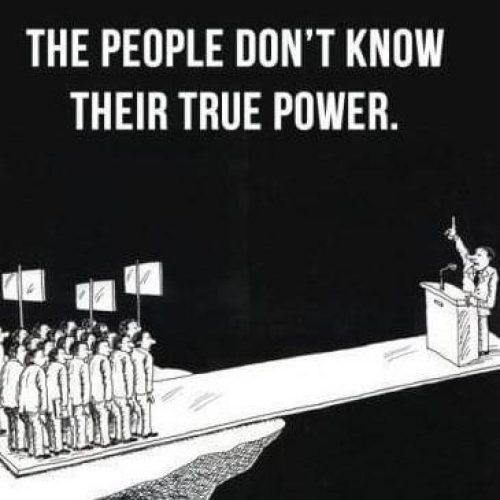
- You can not solve a problem with the same level of consciousness that create dot – Albert Einstein
It is true that “People” do not know their true power, but also they do not know how to take it back. Taking back that power and authority starts by understanding how you gave it away. This discussion between Kris and I has explored how we gave that power away and became something that we are not: persons and in doing so broke the commandments given in The bible. You can explore this further by reading the freely available articles at my website and listening to our other podcasts which can be found here:
- You can also join our capillary wave community and become one of the people involved in taking back the authority that we gave away so cheaply. To register click the relevant button at the foot of this page
Government is only the body; the Crown is the head. The body follows the head, therefore government always goes where the head wants it to go. Both wings are actually controlled by the same bird (the Crown). That is why the head sits above the body on the emblem below:
A head and a body make a person.
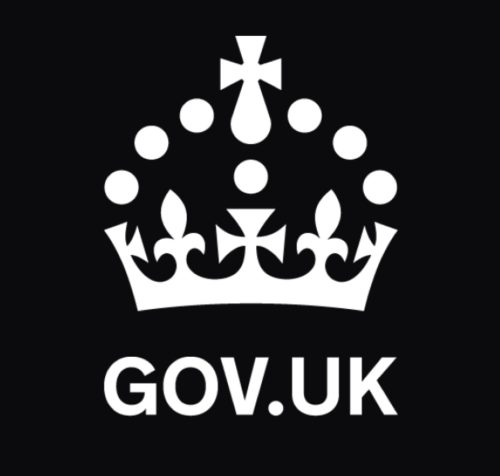
Capillary Wave (def.)
Capillary waves are the first ripples.
A ripple effect occurs when an initial disturbance to a system propagates outward to disturb an increasingly larger portion of the system.
A situation in which one event produces effects which spread and produce further effects.
A series of things that happen as the result of a particular action or event.
